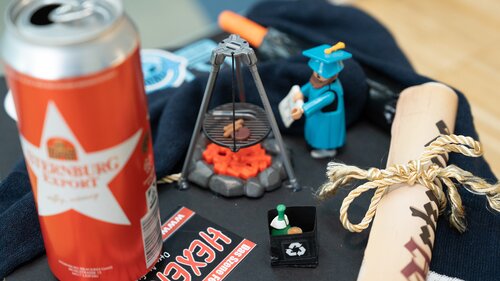„At CISPA, you’re a full-fledged researcher from the beginning“
„At CISPA, you’re a full-fledged researcher from the beginning“
First of all, congratulations on successfully defending your PhD last Friday! What was the topic of your dissertation?
It isn’t easy to explain this in only a few sentences. Basically, I looked at web security mechanisms and their usages and configurations on websites. I found that they are oftentimes wrongly configured or protecting the website users only inconsistently. In order to determine the reasons for this, I interviewed developers to find out about the problems of these mechanisms and how they can be solved.
You spent four years at CISPA. What can you tell us about this time?
I spent four years at CISPA as a PhD student, but it was in 2015 that I first came to the center. I joined the center as a student assistant to Sascha Fahl. I was a third-semester Bachelor’s student at the time. I stayed with Sascha until the end of 2017 when he went to the University of Hannover. I then joined Ben Stock’s team as a student assistant and stayed with him until 2019. It was also with Ben that I started my PhD. I learned a lot during this time, had great fun and met many interesting people.
What support did you receive during your PhD?
At CISPA, you’re treated as a full-fledged researcher from the beginning. You write your dissertation as you go along. But this doesn’t mean that you’re working full time and writing your dissertation in your spare time, as it is the case in many other research institutions. You’re paid for writing your PhD because the PhD is mainly research-based. That is really cool. You get to have a sensible work-life-balance without doing overtime or weekend shifts. And in addition to the full-time position, the salary is very good too.
What was the best experience you had during your time as a PhD student?
In 2019, right at the beginning of my PhD, I was sent to the DEFCON in Las Vegas. And since I was in the United States anyway, I was also allowed to attend the USENIX in Santa Clara. From the start, I was in contact with other researchers and could attend top-tier conferences. This allowed me to see quite a lot of the world and that was great. That first journey especially was amazing, because it was two conferences in a row and also my first time in the United States.

©Felix Koltermann
A farewell gift presented by CISPA colleagues: a lovingly embellished mortarboard
You received supervision as a PhD and you also supervise Bachelors’ theses yourself. What are the things that matter to you when supervising others?
I don’t think that there is one single way of getting it right. Everybody is different and people learn and work in different ways. There are people who prefer working during the night to during the day. There are people who find it easier to learn via reading or listening. I’d say the most important thing about supervising is to meet people’s individual needs. When you can do that, almost everything else will sort itself out. When people are supervised in a way that suits them, they will be happier with their own work as well. And they will have less inhibitions to come to you with their problems and questions.
You are now moving to Vienna after many years in the Saarland. What will you miss and what are you looking forward to?
I grew up near the Saarland and all my friends still live in the region. That’s what I miss most at the moment. The people in Vienna are super nice and not exactly unknown to me because I met many of them before, at conferences or Capture-the-Flag competitions. But it is difficult to start over in a new city where you don’t know anyone properly. But Vienna makes it easy for newcomers to settle in. In contrast to many German cities, Vienna has a very efficient public transport and it is relatively green for such a big city. As somebody who grew up near the river Moselle, I enjoy the fact that you can always see the vineyards.
Many CISPA-researchers who worked here during their PhD return to us later in their career. What are your plans? Could you see yourself coming back to CISPA?
I could definitely picture myself coming back but for that to happen there has to be a vacant position in my field. At the moment, CISPA is quite well staffed in the fields of web security and usable security. So it does take a bit of luck. And now I’ll first turn to my Post-Doc project anyway.
Many thanks, Sebastian, for this interview and all success in your career!
At CISPA, we are offering full-time PhD positions in different research areas. If you are interested in working at CISPA as a PhD student, please visit the following website for more information: https://career.cispa.de/phd.html